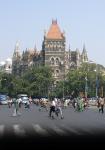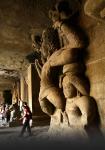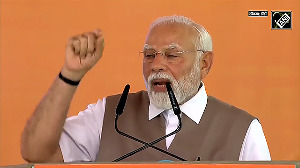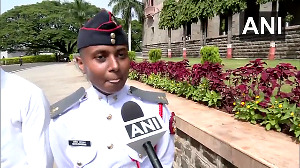The interrogation of former president of the banned Students' Islamic Movement of India Syed Salahuddin Salar has confirmed that a major part of the terror financing for subversive activities in India come from Saudi Arabia.
Salar, who is lodged in a Hyderabad jail for his alleged role in the Dilsukhnagar Sri Saibaba temple bomb blast case in 2002, has been interrogated by the police as well as the Intelligence Bureau over the past couple of days.
Although he denies any role in the blast case, he points out that Saudi Arabia continues to be a major financer for terror in India.
The officers who have been interrogating him say that he is aware of various things in relation to the SIMI. He also speaks about how Gulf is a major meeting point for big terror operatives to plan and execute attacks.
He, however, denies that Dubai is a major hub for such operatives since the government is extremely strict there.
Salar only reiterates what had been said in one of the cables released by Wikileaks. The cable had also stated that Saudi Arabia is a major hub for terror financing and the funds that are generated from there go straight into the hands of the Lashkar-e-Tayiba and Al Qaeda.
According to sources in the Intelligence Bureau, curbing financing from Saudi for terror activities is going to be extremely tough.
There are instances where IB sources have found funds coming in from places such as Muscat and Dubai. However, the funds raised from these places are normally donations from rich people, who are forced to part with the money and the donation is never out of choice, an official said.
"However, that is not the case when it comes to Saudi Arabia. There are a large number of people who share the ideology of terror groups and feel that it is their responsibility to support their people in such a war. Issues such as Kashmir, Babri Masjid and also Godhra continue to stir up emotions and people are more than willing to part with money to fund terror activities in India," the sources add.
Sources in IB also say that they can name at least 40 different charitable organisations that are set up in various parts of Saudi Arabia whose primary job is to raise money for funding terror in India.
The links to Saudi Arabia became extremely clear when the police tracked a hawala transaction of $10,000 (about Rs 4,60,000) which was used to carry out the July 11, 2006 serial train blasts in Mumbai that killed 209 people.
Security agencies say that there is a need for the Saudi government to monitor such activities more closely. Prime Minister Manmohan Singh had also addressed the same concern during his previous visit to that country.
However, what India needs to worry about are the pick up points in India. For operations in Kashmir, the money is directly wired to Pakistan and the funds pumped in through infiltrators. Off late, the Lashkar bosses have instructed these disguised charitable outfits to send more funds into India so that the network can be strengthened.
The collection points in India have been tracked down to three states, mainly Uttar Pradesh, Andhra Pradesh and Kerala. Intelligence Bureau officials have been tracing a lot of such transactions to these states and they suspect that they are only meant for terror financing.
Andhra Pradesh has always had a strong network and money continues to be pumped into that state as well. The big worry is however Kerala for investigators since the entire issue becomes very confusing considering a large Kerala population in the Gulf countries.
There is a report which states that the annual remittance into Kerala through hawala is Rs 20,000 crore. A large part of this money is not meant for terror financing and there are people who are sending money home since they find this method easier. Hence it becomes very difficult to differentiate in this case.
In addition to this what the police have found in Kerala is that the terror operatives are making the job even tougher. Money is directly wired into the state and is not picked up by a member of a terror outfit.
Instead there are some financers who pick up this money and keep it in circulation by lending it at huge rates of interest. These transactions then do not look fishy which makes the job of police difficult.
Sources in the IB say that this pattern is being used in the other states as well.
"It becomes easier for us to track the money down the moment it lands into the hands of a man who is on the radar. However, it is always wired to someone unassuming whom the radar never picks up. However over the past couple of months another trend that is being witnessed is that these persons who pick up the money are loaning it to the lower strata of society and on most occasions these persons become the carriers of such blood money and end up handing it over to the man running the terror module," sources add.










